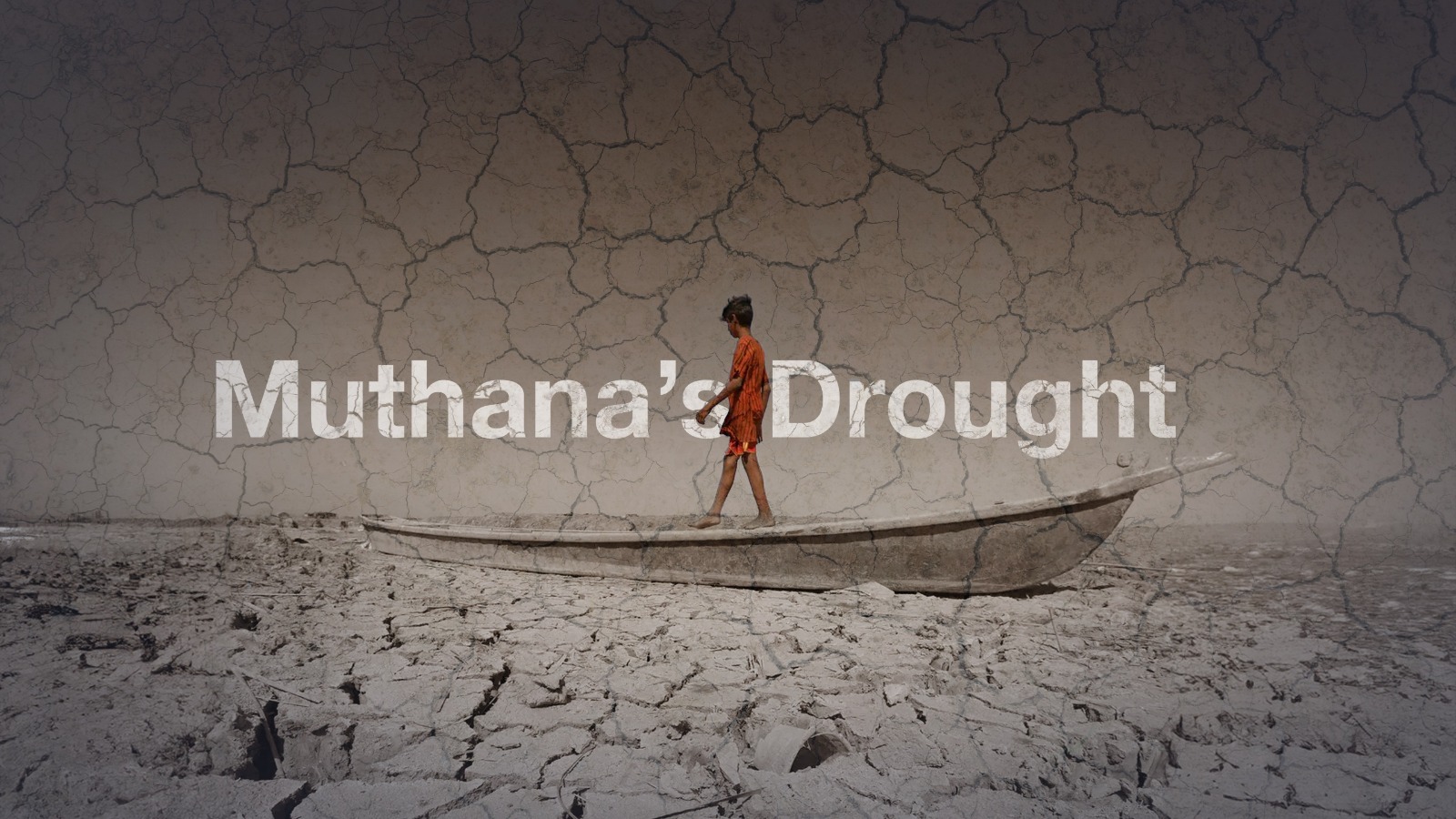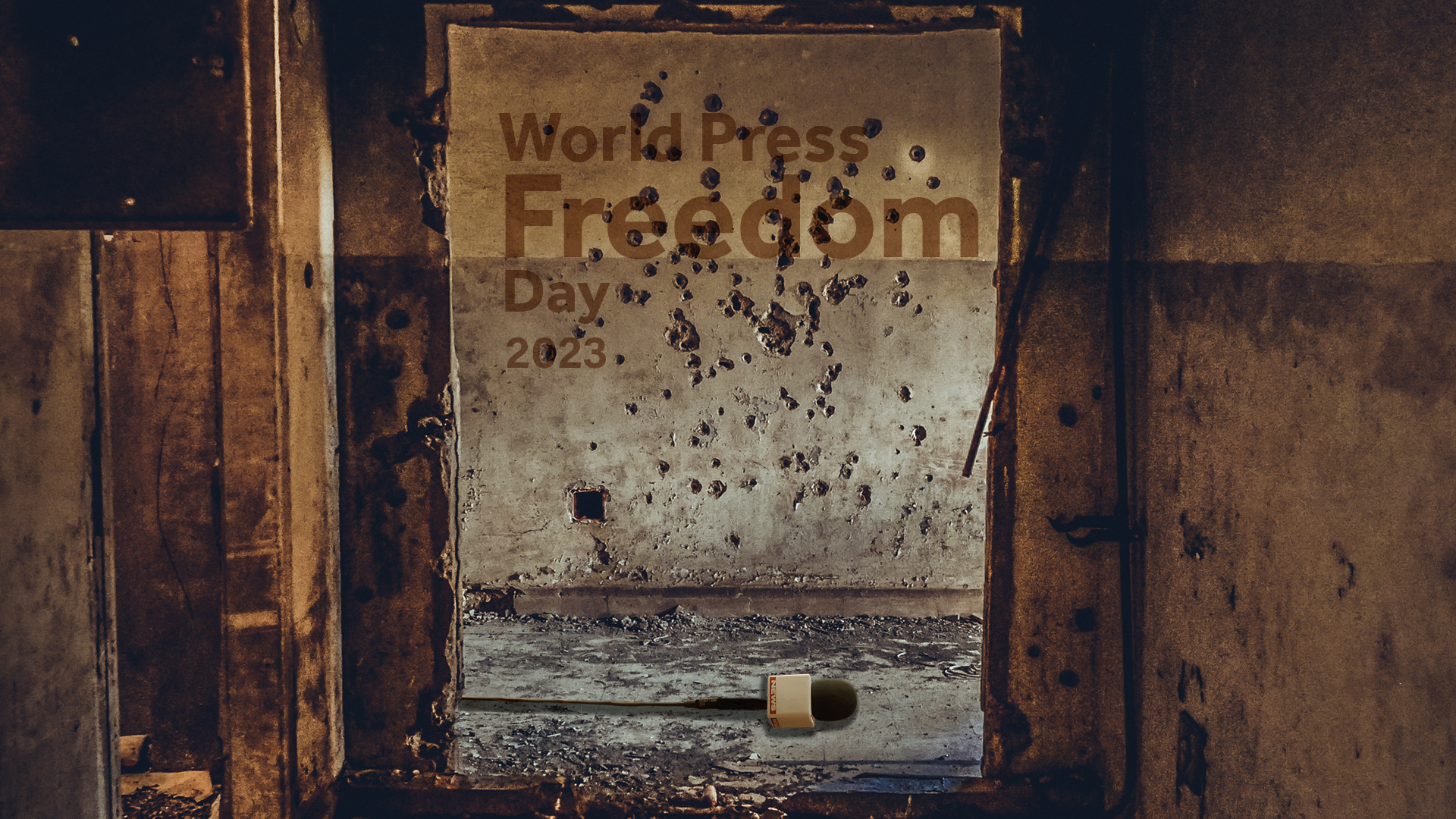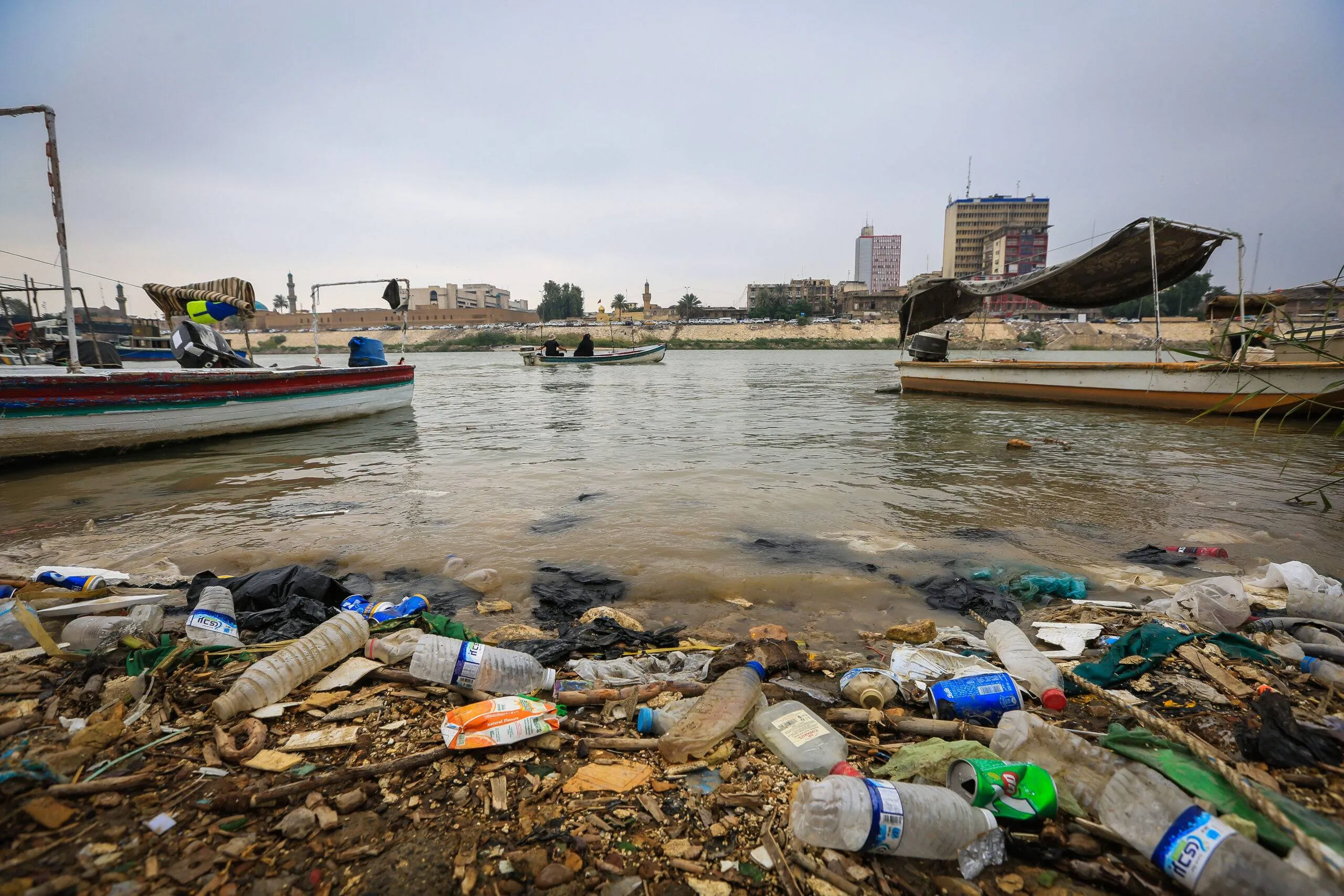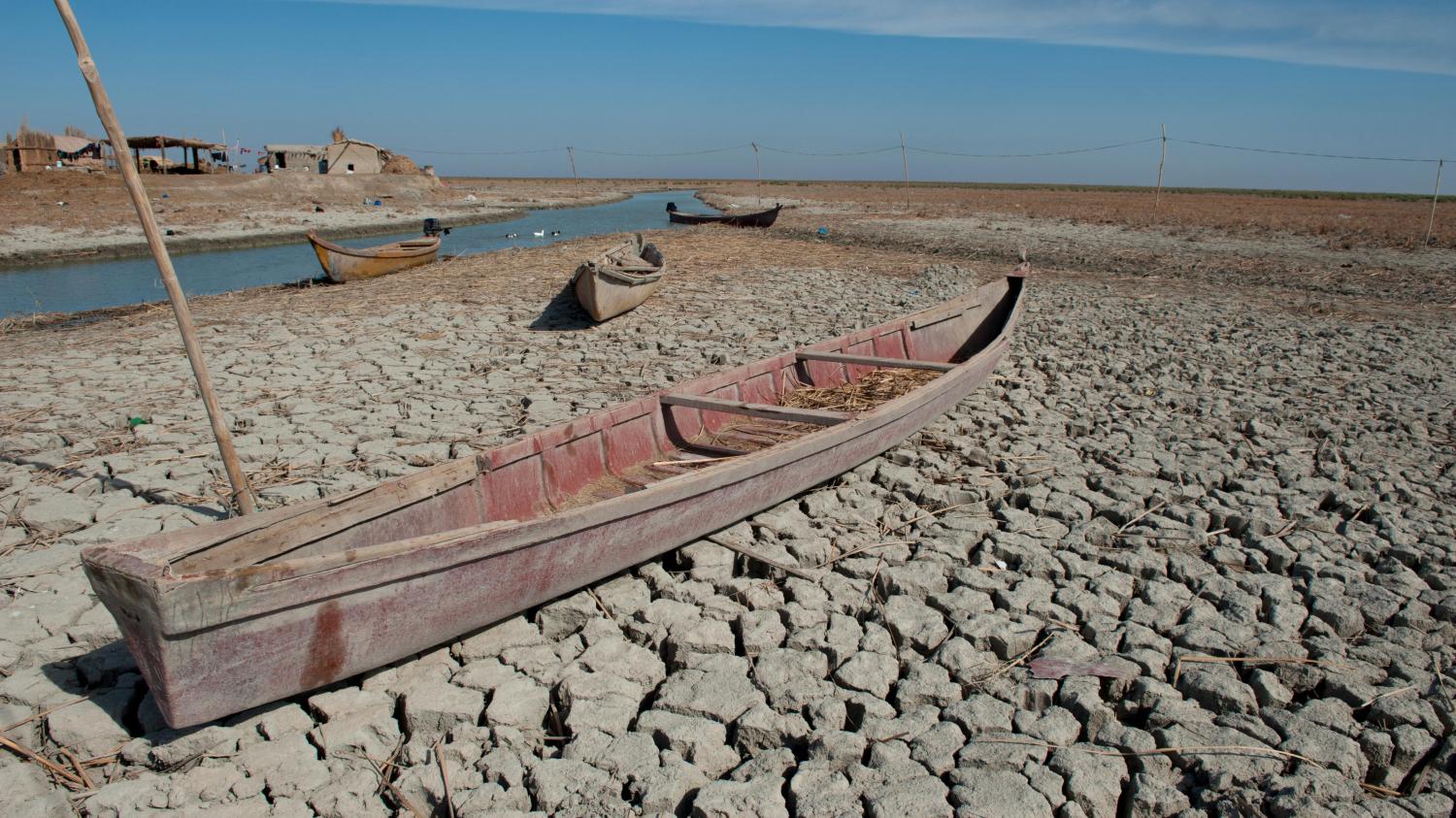This report, which includes testimonies from local residents, government officials, and experts, documents the phenomenon of drought in the Muthanna Governorate in southern Iraq, the poorest governorate in the country. This report concluded that drought may lead to conflicts and mass displacement towards other cities.
The Iraqi Observatory for Human Rights noted on August 21, 2023, that the southern Iraqi governorate of Muthanna is experiencing a major water crisis that may later cause health, social as well as security problems. This is especially true considering that Muthanna is among the most impoverished governorates in Iraq. According to the Iraqi Ministry of Planning Spokesman Abdul-Zahra Al-Hindawi the poverty rate in Muthanna exceeds 50 percent.
Although it is located along the Euphrates River (Muthanna’s Shatt [stream of] Al-Rumaitha is one of the branches of the Al-Hillah stream), Muthanna suffers from major water deficits. Members of the local population assert that the governorate has for over a decade been facing many problems relevant to water scarcity. This crisis has led to vast lands losing their agricultural identity and becoming cropless.
The water crisis in Muthanna is reduced or exacerbated depending on the rainy season and the central water releases allocated for the governorate. Unofficial estimates obtained by the Iraqi Observatory for Human Rights show that around 50 percent of the residents of Muthanna rely on agriculture as their main source of income. Therefore, the shrinkage of agricultural lands in Muthanna could lead to major crises and a spike in poverty rates. It could also prompt locals to migrate to other governorates which may not be better off than Muthanna when it comes to poverty rates and water shortages.
Moreover, water scarcity in Muthanna represents a real threat that could put civil peace at risk and produce a humanitarian catastrophe that circumferences all aspects of society. Local tribes have for years now been jostling for further access to water through illegal means. Additionally, the subsequent Iraqi governments have thus far failed in preventing the larger tribes that enjoy strong political and societal influence from encroaching on water rations.
Meanwhile, the voices demanding an end to this crisis and the provision of tangible solutions for it to prevent the excesses on water rations by adjacent governorates continue to echo. However, local officials and residents in Muthanna whom the Iraqi Observatory of Human Rights spoke to confirm that “nothing has been done yet” to resolve the crisis.
The Iraqi Observatory was also told by locals that what is happening “gravely threatens” their existence in the governorate and that they have been “suffering from water shortages for more than a decade.” Muthanna locals further noted that they "have one of two choices; either to stay and slowly die or to migrate to other cities and governorates, which is also an extremely tiresome option." The locals added, "We are farmers, we are not familiar with any profession other than agriculture. Meanwhile, the government is yet to address the encroachment on our water rations while we only receive less than half of our quota and we don’t know what to do to fix that.”
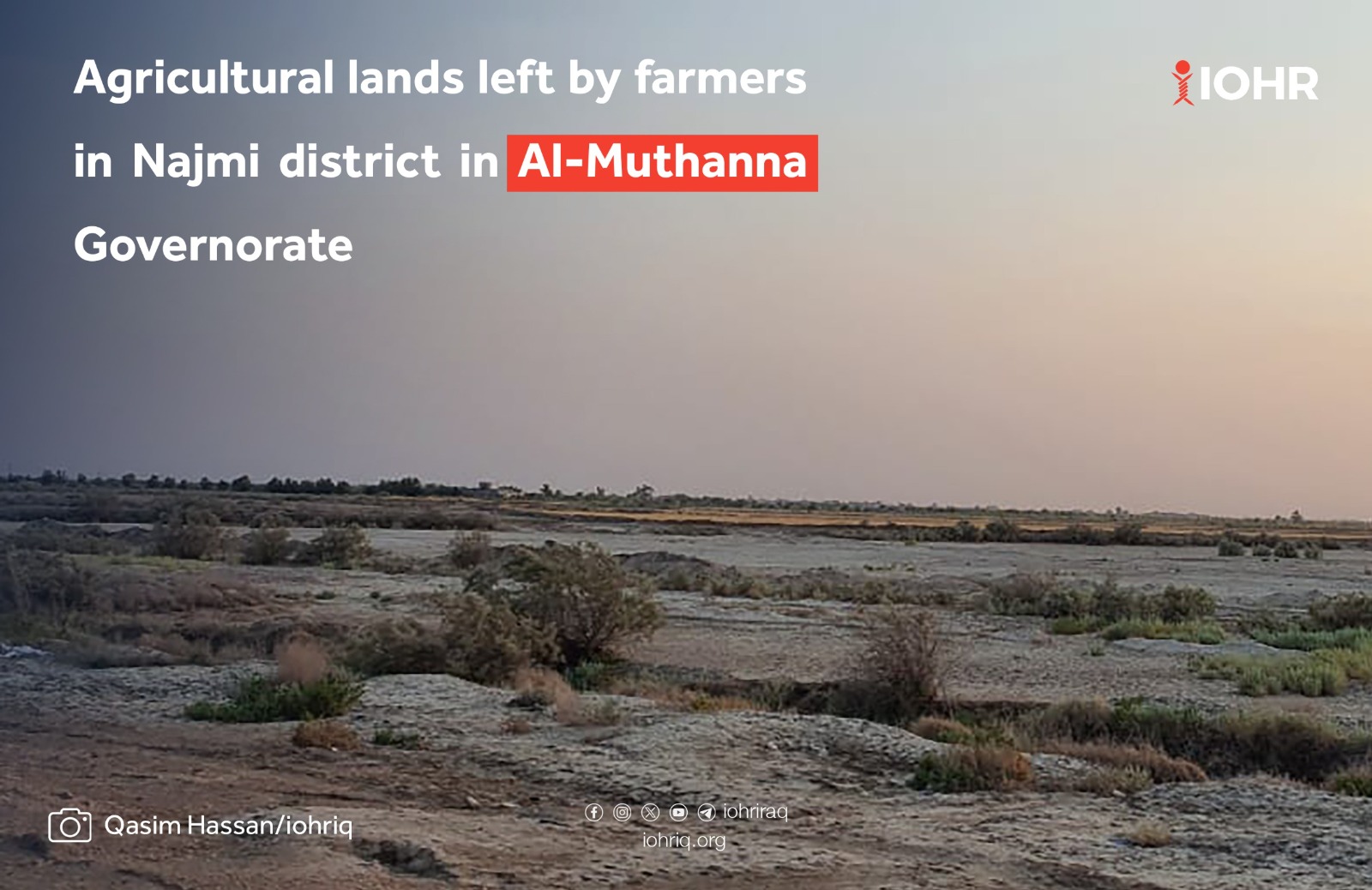
Hussain Taha is a farmer from the district of Al-Najmi which lies north of Muthanna governorate.
Speaking to the Iraqi Observatory for Human Rights Taha described the water dilemma as a “catastrophic crisis." He added, "Most of our agricultural lands have been transformed into barren scorching desert lands which lack basic living necessities.”
Taha also elaborated that the locals “buy drinking water that is transferred from afar. This is burning through our funds. Meanwhile, livestock farming has become very difficult for us as lands cannot be cultivated and water is almost entirely cut off. We were forced to give up animal husbandry and we might soon be forced to leave our homes and lands [in Muthanna].”
Overcome with sadness, the Muthanna local cries, “I was forced to migrate from my place of birth and childhood home. I would have never done so had it not been for water scarcity. I left my farm, my home… everything. I, as many others, moved to the city in search of water.”
The Iraqi Observatory for Human Rights notes that the water crisis in Muthanna is further deepening. The governorate may as a result become an environment that is repelling to its own population especially since a great number of locals rely on agriculture as their main source of income. The Iraqi Observatory, therefore, urges the Iraqi government to provide solutions to prevent the migration of residents to other regions.
Agricultural lands in Muthanna governorate that are dependent on river water shrunk by some 145,000 dunums between 2004 and 2023. While the surface area of such lands stood at 211,000 dunums in 2004, it went down to 66,000 dunums in 2023. However, the local authorities that are responsible for the water dossier in the Muthanna governorate have resorted to digging up wells in the Samawah desert to exploit groundwaters and replenish the prevalent shortage. A local official who spoke to the Iraqi Observatory for Human Rights however confirmed that the majority of these wells are makeshift and unauthorized.
Muthanna governorate is home to nearly one million persons. Its surface area stretches to cover some 51,000 square kilometers representing up to 11.9 percent of Iraq’s entire surface area. While Muthanna is chiefly made up of desert lands, the Central Statistical Organization –an affiliate of the Iraqi Ministry of Planning– says that the governorate also suffers from scarce rainfall.
The Iraqi Observatory for Human Rights spoke to another local from the district of Al-Najmi, Hussain Saeed, who stated that “the solutions presented by the government to resolve the water shortage crisis, have namely been oriented around rerailing rivers to 50-centimeter diameter pipelines that transfer water and distribute it to filtration and liquefaction stations. However, this solution is not sustainable.”
Saeed elaborated that “this solution has not always served a purpose for the [Al-Najmi] district and its vast lands. The same solution had been adopted before in other districts and had sparked waves of migrations. Such districts included the Albu Saleh, Al-Marashda, and the Ahl Al-Hawisha districts among others; many residents have migrated from these due to water scarcity.”
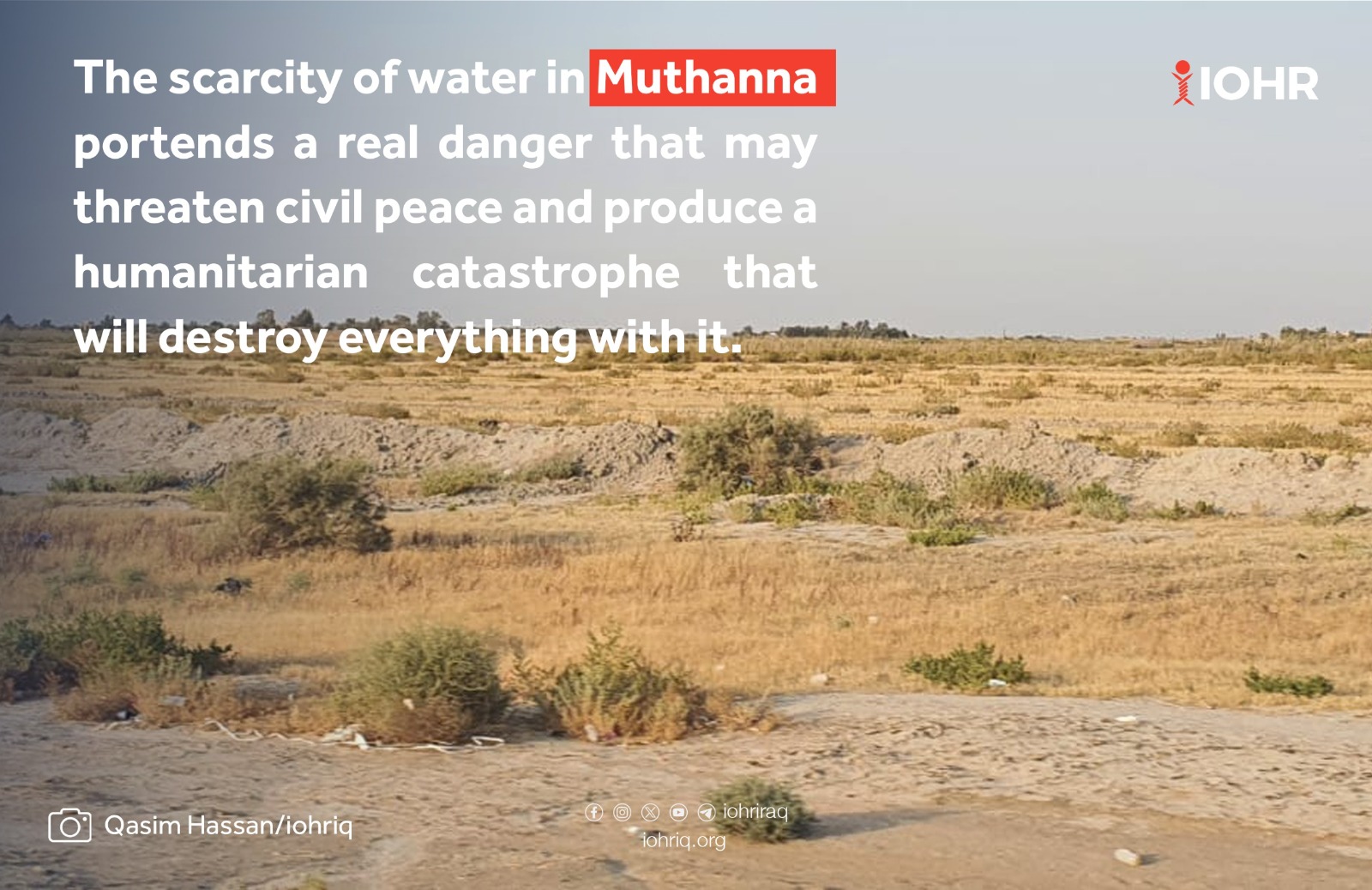
Rahman Daffar is another local from the district of Al-Najmi who suffers from water shortages.
Speaking to the Iraqi Observatory for Human Rights Daffar stated: “We suffer from shortages in drinking water as well as water for agricultural use. We are also subject to the injustice caused by the irrigation department which shuts down the pumps that transfer irrigation water to our district on the grounds of exceeding the water rations.” Daffar added that “the irrigation department extended pipelines to different districts but did not provide water. Our districts are witnessing deprivation. People are fearful of the coming days. Our fate in the governorate has become unknown.”
The Deputy Special Representative and Resident Coordinator in Iraq Ghulam Isaczai visited Muthanna on July 16, 2023, where he stated that “52 percent [of the locals] live below the poverty line and 75 percent of them rely on agriculture and are facing severe water shortages.” Isaczai further added that the “arable lands [of Muthanna governorate] have shrunk from 50,000 to 10,000 dunums” and that the “displacement and migration [of locals] to neighboring regions are imminent.”
Notably, the district of Al-Najmi witnessed mass protests in recent months. Demonstrators demanded access to their water quota among other services. Locals also called on Iraq’s federal government to step in and end their grievance
Mahdi Sultan is a farmer from the Al-Sowair district north of the Muthanna governorate.
Speaking to the Iraqi Observatory for Human Rights about the acute shortage of water in his district of residence, Sultan stated: “We the residents and villages situated along the Shatt [stream of] Al-Sowair are facing an ongoing water crisis that has impacted the filtration and liquefaction stations and forced them to shut down most of the time. Additionally, the majority of [the district’s] lands have turned from agricultural lands where all types of crops and produce are cultivated into desert lands. They have become barren.”
Speaking with a heavy heart Sultan added, “I am a farmer but I am unable to farm. My land has become arid and cropless as a result of water shortages while it used to produce all types of crops of fruits and vegetables. It is lacking the most basic necessities for life.”
The Iraqi Observatory for Human Rights notes that the impingement on water rations is depriving many farmers of continuing their agricultural activities. It is further depriving families of water for domestic use. Amid the notable influence some tribes have in societies, the Iraqi Observatory further asserts that this leverage ought not to be used as an instrument to rob others of their rights and to impose the sway of larger tribes on the remainder of the population.
Ali Al-Ghanemi is a Sowair district local.
Speaking to the Iraqi Observatory for Human Rights Ghanemi underscored that “water scarcity is changing the face of the district. We were forced to migrate to the city which puts us at risk and threatens our livelihood. Decision-makers ought to approach this crisis with all seriousness to put an end to it.”
Experts warn that the ongoing impingement of Muthanna's water quota by neighboring governorates may become worse in the coming days and may even leave the governorate waterless. Speaking to the Iraqi Observatory for Human Rights, environmental specialist Ahmad Al-Jash’ami warned that “Muthanna is witnessing a worrisome water crisis that is chiefly caused by the impingement [on its water rations] by Babil (Babylon), Diwaniyah and Najaf governorates which share the Euphrates riverside with Muthanna.”
Jash’ami further noted that “water scarcity, as well as the decline of most river levels, have transformed arable lands [in Muthanna] to arid deserted lands that cannot be cultivated. Farmers were forced to leave their homes and lands and migrate to the city looking for work and a better living.”
The environmental specialist also warned that the abandonment of agricultural lands has become a highly unsettling phenomenon in recent years and an unprecedented environmental crisis. Jash’ami says that the Euphrates River has further become a waste dump for all the governorates it runs through, which in itself is a major environmental crisis plaguing all of Iraq. “Our rivers have been turned into a brackish sewage water,” Jash’ami adds.
Turki Hammoud Issa is a social activist based in the Muthanna governorate.
Speaking to the Iraqi Observatory for Human Rights Issa stated that “the regions suffering from water shortages are namely situated in stream areas below the Shatt Al-Rumaitha. These regions include the districts of Al-Warkaa’ and Al-Sowair as well as other regions connected to the latter.”
The head of the Muthanna governorate Water Directorate Mohammad Taleb on April 11, 2022, told the state-owned Iraqi Newspaper Al-Sabah that “Muthanna is among the governorates that are most affected by the water crisis. There are impingements on [Muthanna’s] Al-Ta’ziz River and Shatt Al-Rumaitha by Babil (Babylon) and Diwaniyah governorates."
Speaking to the Iraqi Observatory for Human Rights, the Director of the Muthanna Environment Department Youssef Sawadi stated, “The encroachment on the water rations allocated to Muthanna governorate by the Ministry of Water Resources is also polluting the Euphrates River.” Sawadi further noted that the Euphrates waters “have become unsuitable for human consumption.”
Of note, the Iraqi Observatory for Human Rights was unable to conduct an interview with the director of Water Resources in Muthanna governorate [ADD NAME]. Although the Iraqi Observatory had scheduled a meeting with Mr Lateef Ali, he refused to hold the interview despite our representative having waited outside his office for a whole hour.
The local government in Muthanna governorate has resorted to relatively slow solutions to address the water crisis in the governorate. The local administration opted to reduce water consumption through irrigation by axial sprinklers and instillations to tackle water scarcity in the governorate.
Abd Al-Wahhab Al-Yasseri is an advisor to the governor of Muthanna on agricultural affairs. On March 29, 2023, Yasseri stated that Muthanna governorate “did not adopt an agricultural summer plan this year, due to the significant shortage in its water quota.”
Furthermore, on June 21, 2023, the Iraqi Minister of Water Resources Aoun Diab visited the Muthanna governorate. Diab was keen on putting an end to impingements on Muthanna’s water rations and on getting further insight into the water conditions there. In a televised interview he gave to Iraq’s state broadcaster about the violations against Muthanna’s water quota, Diab said: “As a result of the violations, the [water] rights of the governorate [of Muthanna] are being robbed; this issue is subject to legal considerations, and we will not back down in addressing it.”
Water scarcity in the governorate of Muthanna may result in problems that put civil peace at risk, especially in regions where tribes are above the law. Accordingly, the water crisis may well result in new security, societal, and even economic crises. It is for these reasons that the Iraqi Observatory for Human Rights urges the federal government to help the people of Muthanna governorate and preserve their stability. The Iraqi Observatory further calls on the central government to curtail the perpetuation of the losses of Muthanna locals which continue to add up as the water crisis continues.

